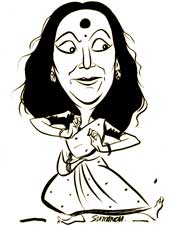|
|
In the Kill Gill lobby, the bubbly is being hastily uncorked. For Kanwar Pal Singh Gill ? the bane of Punjab militants and of civil-right activists alike ? has been held guilty by the Supreme Court of India. Not for human rights abuse, as some have been demanding, but for sexual harassment. But, then, old Al Capone was nabbed for trying to dodge the tax-man.
For Gill, arguably the most controversial police officer in India, Wednesday’s sentencing would mark the end of a messy 15-year-old judicial affair. For some, though, it heralds the advent of a new word in the Indian lexicon ? accountability.
And that’s a word ? his detractors hold ? the enfant terrible of the Indian police force is not greatly familiar with. For Gill is a man who has always done things with impunity ? whether in Punjab, where he was the police chief, or in hockey, which he controls in his capacity as the president of the Indian Hockey Federation, or at social dos.
It was at a party that Gill met his nemesis in Chandigarh, bureacurat Rupan Deol Bajaj, in the late Eighties. Bajaj later filed a complaint saying that Gill had patted her bottom. The case dragged on for years. There were few who were willing to testify in her favour in court, but Bajaj carried on.
The case divided public opinion. Some supported Bajaj, but a vast majority backed Gill. Even now, the Gill fan club seeks to stress that there is more to the man than just straying fingers. They point out that he is the man who controlled militancy in Punjab. And Gill, they intone, is a good man.
He is a true friend,” says an old associate of his, citing Gill’s relationship with Punjab cop Sumaidh Singh Saini as a case in point. An attempt on Saini’s life, while he was travelling in a car, shook the cop so much that he was unwilling to travel by road for days even after he recovered. “But Gill helped him. He went to Chandigarh, drove with him down busy streets and helped him break his fear,” says the associate.
But the Assam cadre supercop, who joined the Indian Police Force in the mid-Seventies, is clearly a man with two distinct images. For his detractors, he will always be the man who headed the police when thousands of young men went missing in Punjab. And some, like Chandigarh-based human-rights lawyer Nav Kiran Singh, are not convinced that it was Gill who brought the violence of the Eighties to an end.
“It was the local population that helped wipe out terrorism, by passing information on to the authorities about militants. It’s just that Gill happened to be there by chance. Otherwise, his logic had always been a bullet for a bullet,” he says.
Gill’s friends will have none of that. Many of them swear that he is a sensitive man, particularly fond of literature. A Punjab watcher remembers travelling with him in a helicopter when sudden rains had flooded the state. “He wrote a poem then which pitted the wrath of nature against the violence unleashed by terrorists. The lines talked about Mother Nature washing the bloody fields of Punjab.”
In the evenings, when his gullet has been suitably irrigated, 70-year-old Gill is said to be particularly lyrical. He likes Urdu poetry and can recite the late Sahir Ludhianvi with his eyes closed. “He is a man who likes all the good things of life,” says an old friend.
But the man who enjoys his P.G. Wodehouse has a dark side to his personality that human-rights activists have been seeking to underline. Police excesses were routine during his tenure as the director general of Punjab police. Singh estimates that at least 10,000 young men were summarily executed.
“People disappeared from houses and were later found buried in mass graves,” adds G.P. Joshi, former director, Bureau of Police Research and Development and current programme coordinator of the Commonwealth Human Rights Initiative. “There were complaints of people being taken away and tortured. Whatever the reason, there was no denying that extra-judicial killings did happen in Punjab, a fact that was known to the government as well.”
Supercop, or the man who unleashed violence ? the debate continues. What’s clear is that Gill has gone and broken a police stereotype: the cinematic favourite of the good-cop-bad-cop duo. For K.P.S. Gill is the man with two faces. He is the good cop ? and the bad cop.











